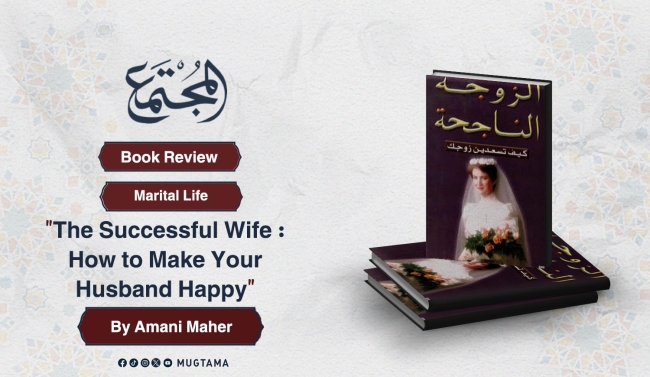Book Review: “The Successful Wife: How to Make Your Husband Happy” By Amani Maher
In her book “The Successful Wife: How to Make Your Husband Happy,” published in 2008, Egyptian author Amani Maher poses several questions about the causes of crises that strike the institution of marriage and disrupt the family structure. She points out that the sources of marital discord are often women: either the wife, the mother-in-law, the husband's sister, or the sister-in-law.
Maher frankly tells her audience that most problems have nothing to do with men. If the husband is involved in an issue, these women often play a leading and fundamental role in turning the husband against his wife, aligning with the common saying, “Look for the woman.”
One of the contradictions Maher notes is that the mother-in-law does not forgive her son's wife for frequently visiting her family, while she excuses and justifies her daughter's constant presence at her own home.
In the first chapter, the author provides a guide to a successful engagement, recalling the words of the Prophet Muhammad (peace be upon him): “When someone with whose religion and character you are satisfied asks your daughter in marriage, accede to his request. If you do not do so there will be temptation in the earth and extensive corruption.” (Narrated by At-Tirmidhi)
Maher sets several conditions for choosing a husband, such as having a good reputation and character, being diligent in prayers and acts of worship, belonging to a family known for its upright behavior, being several years older to ensure maturity, having academic and social compatibility to prevent feelings of inferiority, earning a lawful income, and understanding the rights and duties of marital life.
To complete the selection process, the girl should avoid being dazzled by deceptive appearances or wealth when choosing her life partner. She should also avoid excessive demands for dowries and frivolous matters like wedding dresses, banquet halls, honeymoon trips, and other empty criteria that do not build a home, which have unfortunately become a basis for selection for many girls.
The second chapter, titled “Reading Al-Fatihah,” discusses the legal and social rules to follow after the initial agreement to marry. It warns against being lenient with the fiancé, adorning oneself inappropriately, being too casual in speech and joking, and exaggerating in dress and other aspects.
In the third chapter, Maher warns against modern dancing at engagement and wedding parties, emphasizing that such behavior is vulgar and lowers the woman's dignity. A righteous wife does not dance in front of men and strangers. This behavior, which has spread in many Arab and Muslim societies, contradicts our religion, values, and traditions.
The book highlights the components of the marital home, advocating for simplicity, modesty, and avoiding burdening the husband with excessive debts for household furniture and placing a significant financial strain on him and his family after marriage.
Maher offers various recommendations and advice for the wedding night, including some ancient Arab advice. For example, Abdullah bin Jaafar advised his daughter: “Use kohl, for it is the best adornment, and water is the best fragrance.” Also, the famous advice of Umama bint Al-Harith to her daughter: “The third and fourth points: Be mindful of his eyes and nose; do not let his eyes see anything unpleasant from you, and let him only smell the most pleasant scent from you.”
A whole chapter is dedicated to the marital relationship, explaining its importance and benefits in terms of chastity, protection, and lowering the gaze. The book then covers the duties of marital life, how to treat the husband, showing kindness to his family, maintaining family ties, avoiding extravagance in food and drink, managing the household, avoiding conflicts, and the importance of keeping secrets between spouses.
Maher also outlines the qualities of a successful wife who, with Allah's will, will be able to make her husband happy. These qualities include honesty in safeguarding his honor, wealth, and home, using polite language, being affectionate through kind words and actions, praising and appreciating him, dressing up for him, keeping his secrets, not disrupting marital harmony with excessive demands, avoiding anger and quarrels, and refraining from using money, lineage, or academic degrees as means of reproach.
To ensure marital happiness, the book advises against jealousy and mistrust, damaging the husband's reputation, and destructive ambition driven by materialism and consumerism without considering the husband's capabilities or saving for tough times. A righteous wife supports her husband and only encourages lawful earnings, consulting him in all matters big and small.
The 128-page book offers a simple and smooth overview of marital problems, how to defuse conflicts, and how to save the marital home from misery, estrangement, and unhappiness. The author provides easy recipes for achieving happiness, drawing from a close observation of social reality, exploring what causes cracks in homes that displease Allah and His Messenger, and ways to repair them with wisdom and reason for couples to live in perpetual spring.
-------------------------------------------------------------


